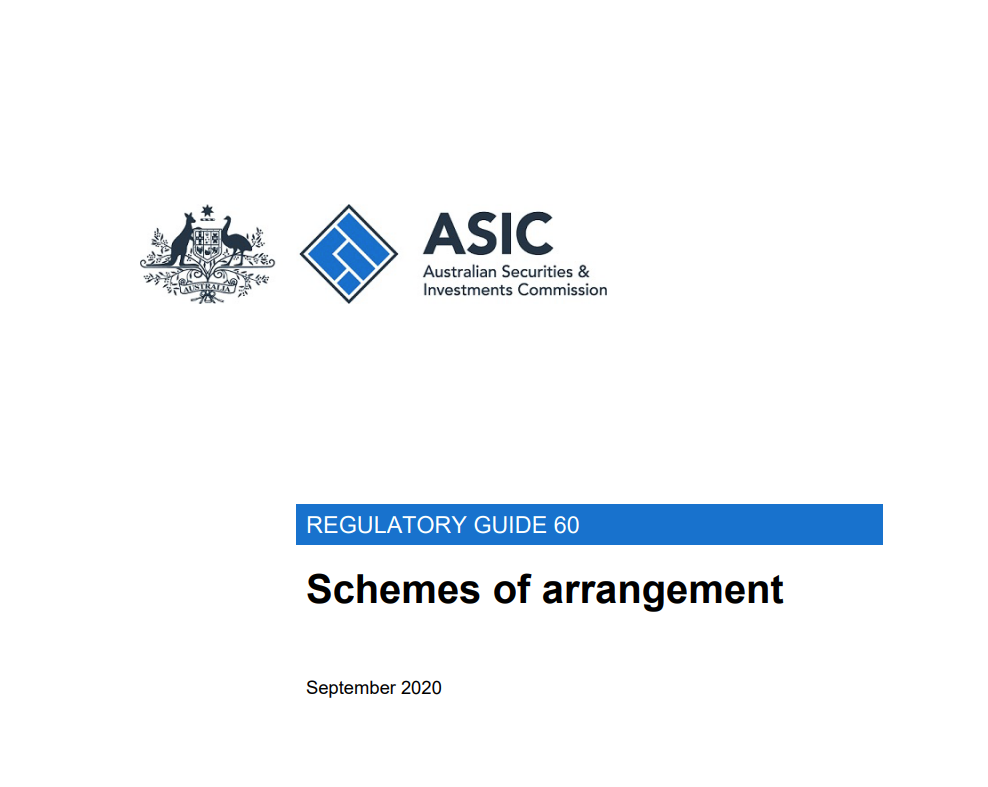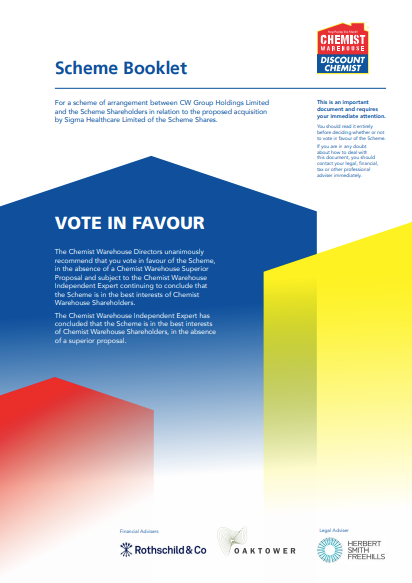What price corporate romance?
If the Chemist Warehouse backdoor listing on the Australian Securities Exchange (ASX) is any indication, the answer is A$40 million (US$25.6 million).
That was the cost of the scheme of arrangement used to merge Australia’s largest pharmacy chain with the already-listed Sigma Healthcare (ASX: SIG) in a A$28 billion deal (US$17.9 billion) completed in February 2025.
The romance analogy was used by an academic to describe the process for acquiring companies which has become increasingly popular in Australia over the last decade, if not longer.
“To me it’s like a forced marriage,” Royal Melbourne Institute of Technology Professor of Finance Angel Zhong told Azzet.
Schemes of arrangement are binding, court-approved processes that allow the reorganisation of company members and creditors' rights and liabilities, according to the Australian Securities and Investments Commission’s Regulatory Guide 60.

In practice in Australia they are the alternatives to traditional takeover bids and allow companies to be acquired, usually by mutual agreement.
To be implemented schemes require court approval, 75% of shares and 50% of shareholders voting, and an explanatory statement and independent expert’s report.
Other examples include proposals from:
- Bain Capital Private Equity, CC Capital Partners and Brookfield Capital Partners for Insignia Financial (ASX: IFL)
- CoStar Group for Domain Holdings (ASX: DHG)
- Novomatic for Ainsworth Game Technology (ASX: AGI)
- Japan Post for Toll.
On the rise
Zhong said their use in Australia increased during the wave of mergers and acquisitions that began in 2009 in the aftermath of the global financial crisis.
She said bidders preferred them because they faced fewer regulatory hurdles and could avoid the Takeovers Panel, the body in Australia that resolves disputes related to contested corporate takeovers.
“Australia didn’t invent schemes but it has perfected their use in takeovers, making them a more attractive option,” she said.
KPMG M&A (mergers and acquisitions) Partner Nick McGlew said schemes of arrangement were the dominant mechanism for takeovers in Australia, accounting for 65-70% of them overall and more than 90% of deals valued at more than $1 billion.
“They provide a binary outcome, it’s 100% or nothing, which is really attractive although it’s an expensive and time-consuming process,” McGlue told Azzet.
“People like the certainty it provides whereas with on or off-market takeover bids, there’s no guarantee you will get to 100%.
“They’re efficient in that you can agree on the deal terms at the beginning of the transaction so it provides a higher degree of certainty up front.
“You can also get a very effective lock-ins like ‘no shop, no talk’ and the right to match competing offers”.
McGlue said they were more time efficient, typically taking about three months, whereas off-market takeovers required the approval of a “long tail” of shareholders, some of whom may be deceased or did not open their mail.
He said although changing the terms of a scheme was difficult and probably encouraged competing offer, bidders could seek a public statement of support from key shareholders in the absence of a superior proposal.
“The cons are that they are less flexible when you get a counter bidder, which can wait until close to the scheme meeting and submit a proposal. It’s difficult to change a scheme so you are sitting there exposed,” he said.
Australian Shareholders Association company monitor committee Chair Mike Robey described Chemist Warehouse’s deal with Sigma as a “masterstroke” because it saved millions of dollars in fees that would have been paid to advisers in an initial public offer.

He said that as a private company Chemist Warehouse had been prepared to “open the kimono” to disclose details of its financial performance.
Growing up
Robey said companies were becoming more mature by negotiating details before making offers, avoiding accusations of exploiting shareholders by making low offers when share prices are depressed.
He cited BHP Group’s (ASX: BHP) failed attempt to take over of Anglo American (LON: AAL) last year as an example.
“The thing we look out for is whether there’s enough due diligence and if it’s a good enough offer because it’s pretty hard to tell sometimes when you’re a shareholder,” Robey said.
“It’s a bit like getting quotes from trades – you won’t know unless you’ve had two or three, and that’s not particularly fair because bids are always different with scrip and cash and all sorts of ways they put them together.”
Robey said disclosure usually made it clear if a target company was under duress, bidders were required to communicate with shareholders even if they faced no competition, and minority shareholders losing influence over a company had the option of selling out or remaining with a larger company that may be more profitable.
The retention of key staff may be a condition for a scheme to proceed.
Although these schemes could potentially trigger tax liabilities, the Australian Taxation Office can grant exemptions by providing capital gains tax (CGT) rollover relief if they are treated as changes of arrangement rather than sales.
This was the case for Telstra’s (ASX: TLS) corporate restructure in 2023 when a new holding company was created with separate operational businesses.
Robey said the fact that the approval level was lower than usual for takeovers was a vote of confidence in the schemes but implied regulators could expect more scrutiny.
“Certainly I talk to a few of our members about this and they have much more confidence in a scheme that in a takeover,” he said.
BDO Partner Ashton Lombardo said schemes had been popular because they provided certainty, noting however that minimum acceptance levels could be dropped in takeovers to achieve control.
“That being said, there are still a lot of risks involved with a scheme arrangement that maybe some people don't appreciate,” said Lombardo, whose Perth-based team specialises in independent expert reports for schemes.
“Although it gives you certainty in terms of either getting zero or 100 % there's also additional process risk.”
They required the agreement of both companies on terms, independent expert reports with ASIC approval, and court and shareholder approval.
Although companies could not face competing schemes, they could be subject to takeovers.
He provided the example of Atlas Iron, which was taken over by privately-owned Hancock Prospecting for A$440 million cash in 2018 after a scheme to be acquired by Mineral Resources (ASX: MIN) in a $280 million all-share deal failed to proceed.
Another scheme that did not proceed was the $18.7 billion offer for Origin Energy (ASX: ORG) from a consortium led by Brookfield Asset Management and EIG Partners in 2023 which failed to receive shareholder approval after opposition from Origin's largest shareholder, AustralianSuper.
